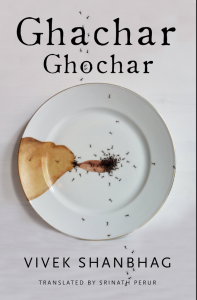Vivek Shanbhag’s “Ghachar Ghochar”, translated by Srinath Perur
 It’s true what they say — it’s notwe who control money, it’s the money that controls us.
It’s true what they say — it’s notwe who control money, it’s the money that controls us.
…
And let’s face it: there’s a vast difference in the moral underpinnings of a business family and the household of a salaried teacher.
Vivek Shanbhag’s new novella, Ghachar Ghochar, (HarperCollins India) translated from Kannada by Srinath Perur is about a middle class family that decides to start a spice business. The family prospers financially primarily due to the hard work of the young uncle. The narrator is sitting in a coffee shop reflecting, commenting and analysing his life. It is not exactly an interior monologue but it leaves you feeling as if it is. It is a vignette of a middle class life with some very perceptive comments embedded in the text such as “The woman had not abused. She had not come here to pick a fight. We were thrown off balance by her love for one of us, and so we tore into her with such vengeance that she collapsed to the ground, sobbing. Amma and Malati called her a beggar, a whore, and it was clear from the disbelief on her face that she had never been spoken to in this manner. … On that day I became convinced that it is the words of women that deeply wound other women.” (p.15-16)
It is the only translation from an Indian regional language that was included in the Granta edition on India edited by Ian Jack published in 2015. With the publication of this book debates about translation have opened up once more. Purists claim that they are not happy with the it. Those who are familiar with the complexity of Vivek Shanbhag’s writing in Kannada say that the ending of the English version is too tame. I cannot comment since I am unable to read the text in Kannada but I do know that I am very glad that this story was made available in English by Srinath Perur. If it helps reactivate a debate on whether the English translation is true to the original text or is it catering to a new audience by capitulating to their tastes for world literature or is the ending in the English text a weakened version of the original then so be it. These conversations are necessary and a requirement for a healthy debate about the quality of literature. All said and done, this is finely etched novella should be essential reading.
Update ( 24 March 2016):
Recently the author read this blog post and sent me this email. I am posting an extract here with permission:
Dear Jaya,
I read your blog post. I edited and added a few pars to the Kannada version before it was translated into English. And this revised version is yet to be published in Kannada.
Not a sentence from the original was edited by the (Harper) editors, except one for providing more clarity. There were some small edits to make the reading better in English but not to alter the meaning of a sentence. So the English version is not really “tame” as compared to the original on which it was based. But I must admit that no Kannada reader has access to the new version it as it is yet to be published.
Warmly,
Vivek
Vivek Shanbhag Ghachar Ghochar ( translated from Kannada by Srinath Perur) Harper Perennial, HarperCollins Publishers, NOIDA, India, 2015. Hb. pp. 115. Rs 399.
January 2016

No Comments